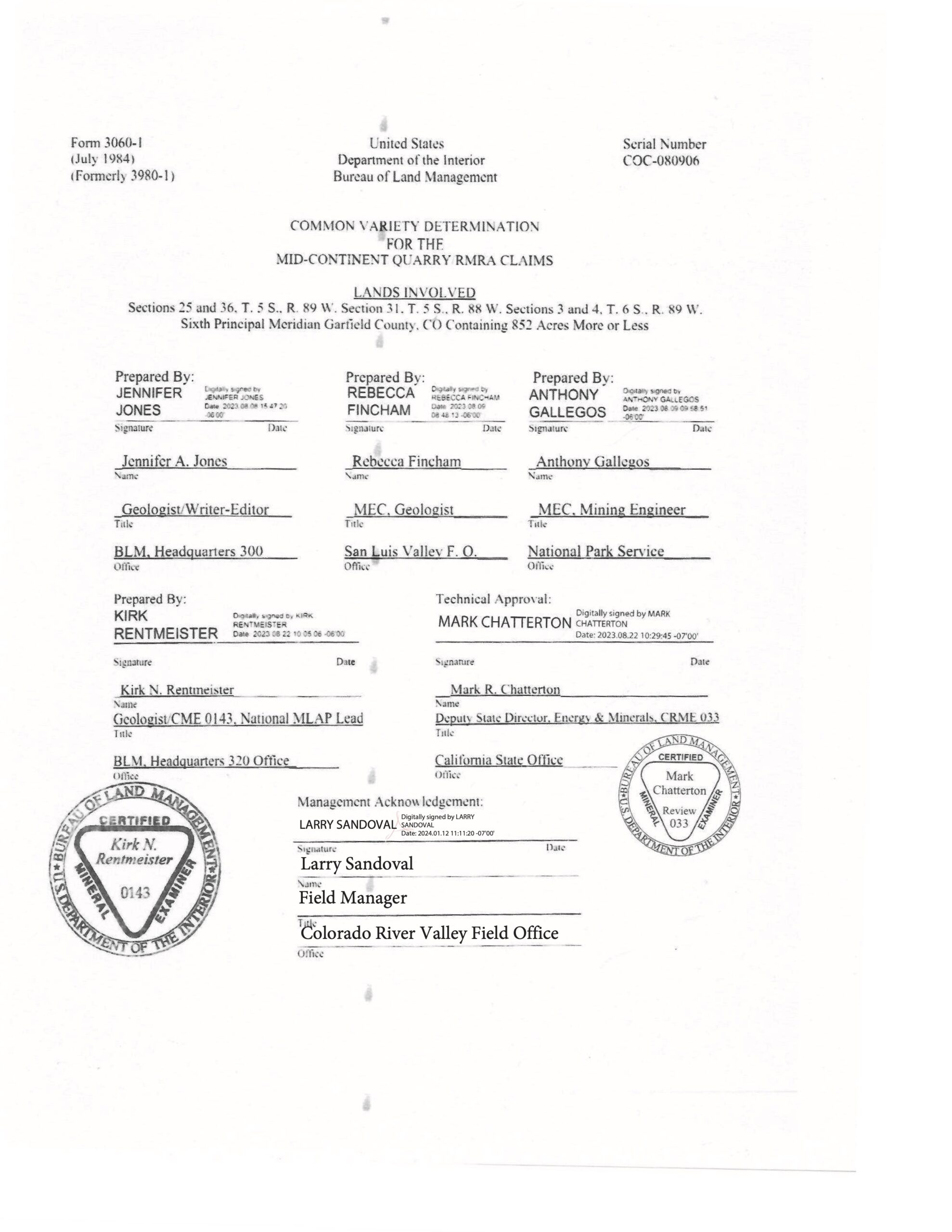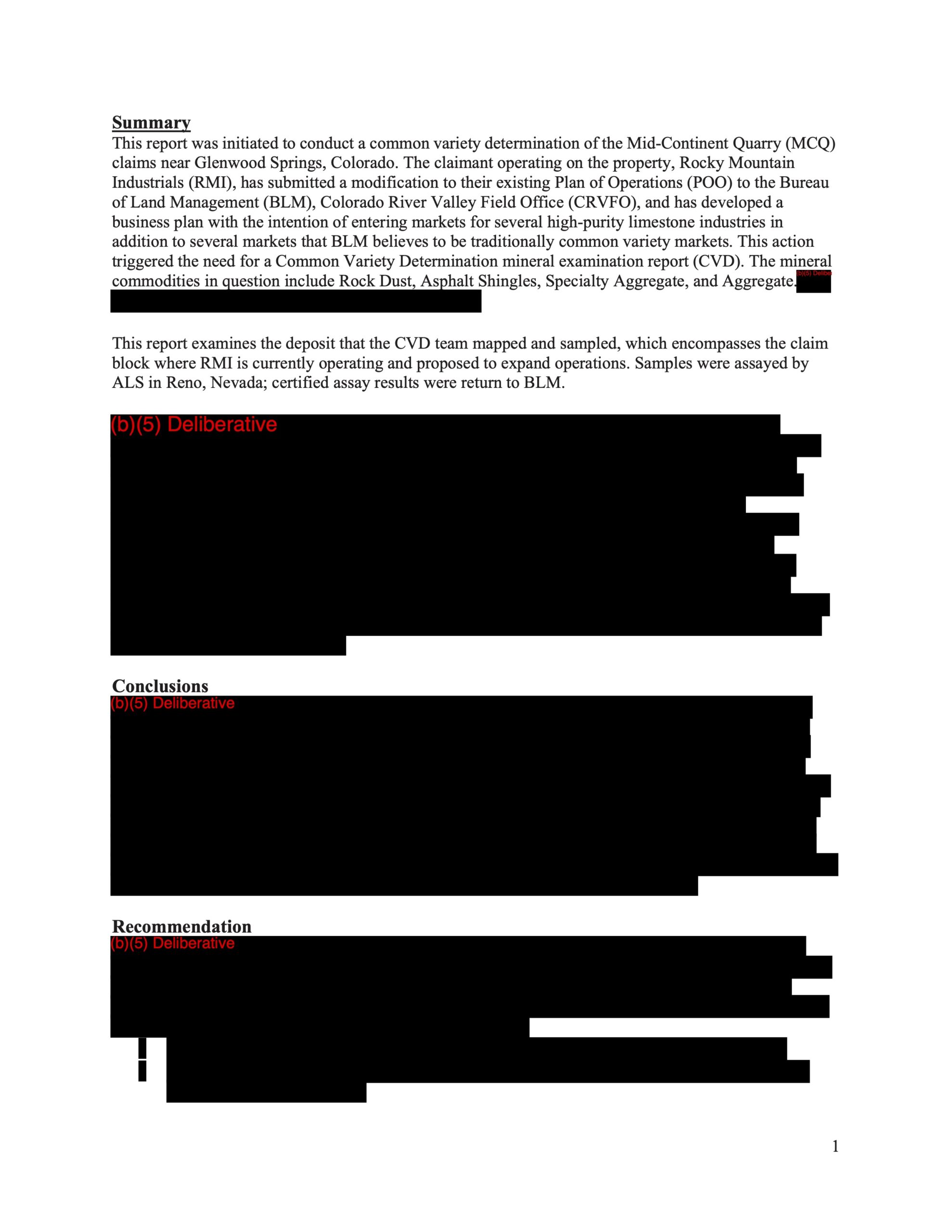BLM releases Determination of Common Variety report
RMI must fork over escrowed funds
Most of mined limestone fails to qualify for Mining Law of 1872
On Jan. 31, 2024, the U.S. Bureau of Land Management released its long-awaited Determination of Common Variety report for the Rocky Mountain Industrials limestone mine.
The Determination report, or DCV, shows that the majority of limestone sales from RMI’s current quarry and for its proposed mine expansion fail to qualify under the Mining Law of 1872.
The Citizens’ Alliance has contended for years that RMI has been mining limestone for purposes far afield from its permit for mining on federal land, which is based on a narrow list of uses allowed under the Mining Law of 1872.
BLM Field Manager Larry Sandoval summarized the DCV’s findings, saying, “BLM has determined that a majority of the material is not disposable under the Mining Law of 1872 because of being marketed for common purposes.”
For example, the DCV notes that RMI’s expansion proposal “provided no evidence or data that substantiates that this [limestone] deposit has unique or special properties that set it apart from other deposits that are used for aggregate for the same purposes.” (DCV page 47)
The agency’s position marks a pivotal point in its review of current mining at the Transfer Trail quarry and of RMI’s massive proposed mine expansion, said Jeff Peterson, president of the Citizens’ Alliance.
If RMI’s end uses for the mined limestone had qualified under the 1872 Mining Law, the company would have few regulatory limits on environmental and economic impacts, and would have no obligation to pay royalties on its sales.
BLM’s Sandoval noted that the agency does not consider the DCV report to be a decision, thus making it not eligible for appeal.
Most end uses appear to require sales contract
The DCV disqualifies almost all end uses put forth by RMI, such as rock dust for coal mines, road base, rip-rap, structural boulders and chicken grit.
Mining and sales of these non-qualifying uses would need to be approved under a BLM mineral sales contract, which entails a process that would include public review.
The DCV singles out just one possible exception that would qualify under the 1872 Mining Law, the use of high-quality limestone in adjusting the chemical balance in cement for airport runways. BLM has provided no evidence in the redacted DCV to show that RMI has sold any limestone for that purpose. BLM has also refused the Alliance’s many requests to produce RMI’s recent sales records to verify these assertions.

The cover page for the Common Variety Determination report, dated Jan. 12, 2024.
The report was researched and written by:
• Kirk Rentmeister, geologist and certified mineral examiner, BLM Washington, D.C. office
• Rebecca Fincham, geologist, BLM San Luis Valley Field Office, Colorado
• Anthony Gallegos, mining engineer, National Park Service
• Jennifer A. Jones, geologist and editor, BLM Washington, D.C. office
• Technical approval by Mark R. Chatterton, deputy state director, BLM California state office
• Management acknowledgement by Larry Sandoval, field manager, Colorado River Valley Field Office, Colorado
RESOURCES
Redacted Determination of Common Variety (DCV) report
Caution: large file size: 205 pages, 29 MB
DCV cover letter ordering RMI to fork over funds in escrow (2 pages, 1 MB)
BLM Memorandum discussing legal findings related to limestone as a locatable or common variety mineral (6 pages, 184 KB)
“With the DCV’s findings in hand, it appears that original mine approvals from 1982 are no longer valid. Mining should be halted unless RMI obtains a federal mineral sales contract and resolves its other permit noncompliance problems." -- Jeff Peterson, President, Glenwood Springs Citizens' Alliance

Page 10 of the Determination of Common Variety report, at left, showing blacked-out sections, called “redactions.”
About half of the contents of the DCV released to the public on Jan. 31, 2024, were blacked out, including narrative, tables, maps and photos.
Of the 205-page report, 75 pages were fully blacked out with redactions and another 23 pages were partially redacted.
BLM calls for release of funds in escrow
A cover letter to the DCV is addressed to Robert Wagner, an RMI vice president. It calls on RMI to tally the funds in a mineral fees escrow account, established in 2019, by Feb. 20, 2024.
The letter gives RMI until Feb. 25, 2024, to remit to BLM the escrowed payments for all sales since 2019 that don’t qualify under the Mining Law.